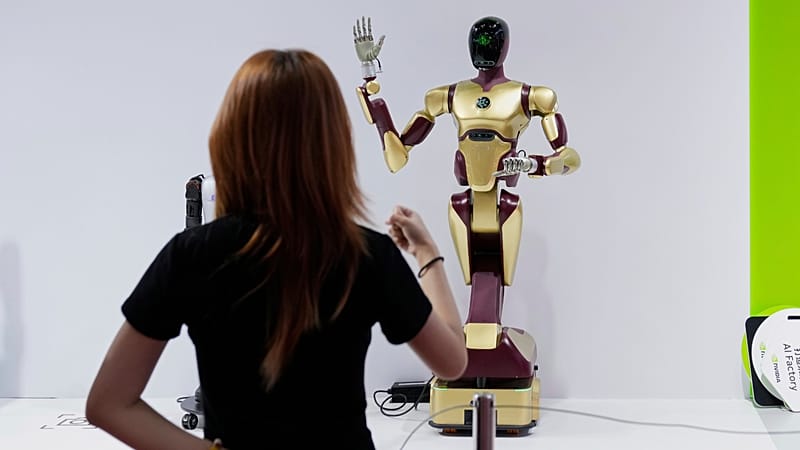Nvidia leader calls on Europe to step up in global AI race, predicts tech’s next frontier

A top executive from tech giant Nvidia called on Europe to step up in the global race to develop artificial intelligence (AI) during an exclusive interview with Euronews Next at the Web Summit tech conference in Lisbon.
Rev Lebaredian, the company’s vice president of omniverse and simulation technology, said that for Europe to keep up with the United States and China in artificial intelligence (AI) development, it needs to have the foundational infrastructure that allows researchers and entrepreneurs to build the technology.
“Without the AI factories and without the energy to power them, it won't matter how much talent is available here [Europe]. But if Europe chooses to do this, then it certainly can be leading,” he said.
Europe “should be a centre for AI, computer science, and all technology, but Europe has to participate,” Lebaredian added.
The European Commission announced last month that it would be adding more AI factories to its remit, giving the bloc a total of 19. AI factories are a type of data centre and the infrastructure that produces AI capabilities at scale.
Lebaredian said Europe will also struggle to meet the high energy demands that AI requires, especially as energy is generally more expensive than elsewhere in the world.
He said this is a “choice that Europe can make in terms of building out new energy”.
There are diverse sources of energy that are being used for AI in Europe, including nuclear, hydroelectric, and renewables, particularly wind energy.
“There's no such thing as progress in any society without energy. … That is a fundamental ceiling to progress,” Lebaredian said.
“Europe should be working towards increasing the amount of supply of energy, just like every country should be doing. This is fundamental to growth and prosperity”.
Physical AI
AI promises to transform every aspect of life, from medicine and drug development to general tasks being automated.
For chip giant Nvidia, physical AI, meaning robotics, will be the next phase of AI after generative AI.
Lebaredian said robots will probably come to industrial spaces first “because the demand there is already very clear. We have a global shortage of labour in these kinds of physical industries, particularly the ones that have the three Ds – jobs that are dull, dirty, and dangerous”.
“We don't have enough young people who want to do these jobs, and we have an ageing workforce that's retiring out of these jobs. So the demand is very clear there,” he added.
How quickly we will see robots in our homes is less clear, he said. That’s despite the attempts of several companies, including the NEO humanoid robot, which aims to do household chores still needs a human to intervene.
“Consumers tend to be fickle and they tend to have different wants and needs. Depending on their cultural geography, it might be uneven and consumers also need it to be a lot less expensive before they will consider it,” he said.
“It has to be a lot safer and in these unstructured environments, like in the home but it will happen there for sure”.
Lebaredian said in some ways, safety with physical robots is easier to test and fortify than safety with AI chatbots or agents, which “can be your friend or characters and whatnot. With physical robots, we can measure safety just based on how they behave”.
Autonomous driving
As part of its robotics push, Nvidia is going all in on autonomous driving. Last month, the company announced a partnership with Uber to build a fleet of 100,000 robotaxis and autonomous delivery vehicles.
Nvidia said the fleet will start rolling out in 2027.
The company is aiming for level four of autonomous driving, which is one level higher than the current robotaxi models that are available today.
Level four autonomy would mean the vehicle can operate in self-driving mode. But until laws and road infrastructure evolve to match the technology, these vehicles could only drive within limited areas.
Nvidia and Uber are also working together to develop a data factory to process the vast amounts of data needed to develop autonomous vehicles.
They will use the data, collected from tests in a virtual world, to make the vehicles safe, Lebaredian said.
“We test them in essentially something that's like a video game where it's very safe. We can run these scenarios that would normally be dangerous for the humans and the cars involved in this. But inside a video game, nothing happens. If there's an accident in there, it's just a video game,” he said, adding that these simulations “match the real world very closely”.
Once self-driving cars are available in the real world, more data can be collected to improve the vehicles, Lebaredian said.
“They'll, I think, very quickly become better drivers than all humans,” he said.

